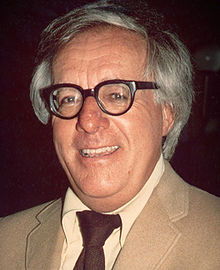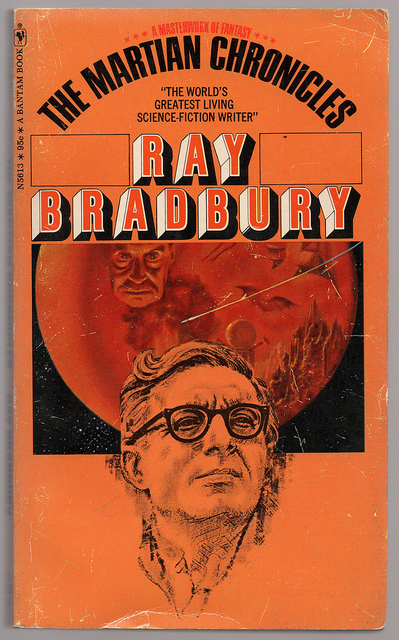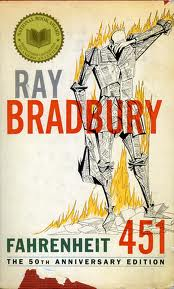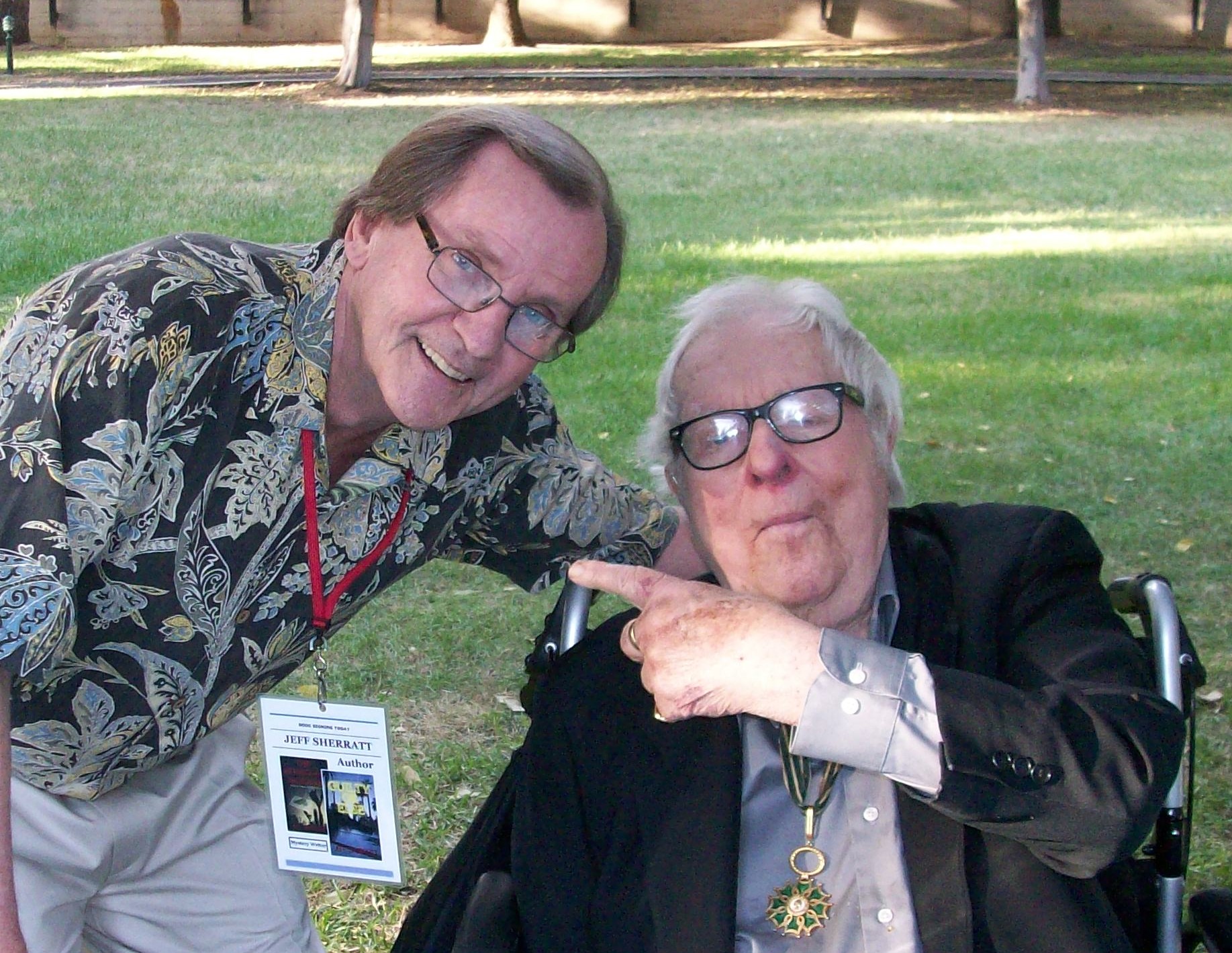For many years now, Ray Bradbury was often referred to as “the world’s greatest living science fiction writer.” Not  many people would dispute that statement. Sadly, this giant of science fiction and fantasy passed away earlier in the week at the age of ninety-one. But what a remarkable legacy he left us.
many people would dispute that statement. Sadly, this giant of science fiction and fantasy passed away earlier in the week at the age of ninety-one. But what a remarkable legacy he left us.
I wrote about Bradbury a couple of weeks ago in a post about Edgar Rice Burroughs, one of his favorite writers—and my own muse. In 1930, at the age of ten, Bradbury fell in love with ERB’s works, as well as the stories of Edgar Allan Poe, and life in his hometown of Waukegan, Illinois was never the same. From then on, Bradbury never stopped reading, nor did he stop writing. He sold his first story when only twenty, and ten years later he published his classic novel, The Martian Chronicles, arguably his most famous work, and a staple of college and high school English classes. No surprise, then, that in Bradbury’s introduction to an extensive 1975 biography of ERB, he wrote: “[Burroughs’] greatest gift was teaching me to look at Mars and ask to be taken home.”
Bradbury’s prose read more like poetry. Reading his words, I felt as if I were hearing a song. Listen to—feel—this passage from The Martian Chronicles:
passage from The Martian Chronicles:
Rocket summer. People leaned from their dripping porches and watched the reddening sky.
The rocket lay on the launching pad, blowing out pink clouds of fire and oven heat. The rocket stood in the cold winter morning, making summer with every breath of its mighty exhausts. The rocket made climates, and summer lay for a brief moment upon the land.
In his lifetime Bradbury wrote hundreds of stories, a number of screenplays, and over two dozen novels, including Something Wicked This Way Comes (my favorite) and Fahrenheit 451. (Perhaps the latter was his favorite, as he asked that his headstone read: Author of Fahrenheit 451.)
Bradbury moved to Los Angeles with his family when he was thirteen and spent the rest of his life there. He and his wife of fifty-seven years, Marguerite, raised four daughters. Marguerite passed away in 2003.
I did not know Ray Bradbury personally. I met him at a book expo in the 1980s, just one of a thousand folks to  shake his hand and offer a few words of praise. My good friend, Jeff Sherratt, shared a table with him at an author event a few years ago. This was his experience:
shake his hand and offer a few words of praise. My good friend, Jeff Sherratt, shared a table with him at an author event a few years ago. This was his experience:
“How can this be? I asked myself. Ray Bradbury, the greatest living American writer, an icon, an author whose life and work are the subject of high school courses everywhere, is holding up my mystery novel and saying to the crowd gathered there, ‘This is a good book!’
“One of the wonderful things about being a published author is the people you meet while promoting your novel. In the summer of 2009 I received a call from the event organizer of a small Southern California Book Festival, asking if I cared to participate in their Festival of Authors held later that year in October. Only one thought ran thought my mind as she explained the details: how could I turn down such a nice lady? You see, I had a commitment for that weekend, signing books at the West Hollywood Book Festival, where thousands of readers would be in attendance. But I didn’t say anything, and she kept talking…three hundred people at her event. I’d be on a panel with other authors, and so on. But wait. Did she say Ray Bradbury would be the guest speaker? My immediate response: ‘What time do you want me to be there?’
“Millions of people knew Ray Bradbury through his work, but I wondered, as I sat next to him that pleasant fall afternoon, how many knew of his kindness and generosity? Throughout his life he gave his  time freely supporting literacy causes everywhere for no personal gain. He gave thousands of talks at local libraries and attended many small book events where his name would guarantee success. I experienced his kindness firsthand that day when, in a wheelchair at almost ninety years old, he pointed to me and said, ‘This guy can write!’ He did that for me even though I knew he’d never read any of my books.”
time freely supporting literacy causes everywhere for no personal gain. He gave thousands of talks at local libraries and attended many small book events where his name would guarantee success. I experienced his kindness firsthand that day when, in a wheelchair at almost ninety years old, he pointed to me and said, ‘This guy can write!’ He did that for me even though I knew he’d never read any of my books.”
As for his legacy, Ray Bradbury doubtless said it best in his 1953 classic, Fahrenheit 451. I need add no more:
“Everyone must leave something behind when he dies, my grandfather said. A child or a book or a painting or a house or a wall built or a pair of shoes made. Or a garden planted. Something your hand touched some way so your soul has somewhere to go when you die, and when people look at that tree or that flower you planted, you’re there.
“It doesn’t matter what you do, he said, so long as you change something from the way it was before you touched it into something that’s like you after you take your hands away. The difference between the man who just cuts lawns and a real gardener is in the touching, he said. The lawn-cutter might just as well not have been there at all; the gardener will be there a lifetime.”

I read 451 last semester and thought it was an interesting read, It’s a shame because I really admire Bradbury’s dedication to writing and reading every day.
Thanks, Eric. He was an icon.
Such an inspiring writer, as are you.
Aw, shucks, Some folks, like you, make it easy to inspire.
Thanks Mike for adding my comments.
I had met Ray Bradbury once before, in the mid-sixties. I had a business lunch appointment scheduled at the Brown Derby Restaurant in L.A. The traffic moved that day so I arrived early. When I walked in the restaurant I spotted Bradbury sitting alone in a booth. I usually don’t bother celebrities, but with Ray Bradbury I couldn’t help myself. I stopped on the way to my table to quickly tell him how much I admired and enjoyed his work. Imagine my surprise when he invited me to sit and talk for a little while. I can’t remember exactly what we discussed, but I stayed with him at his table for about ten minutes, until his guest finally appeared.
I brought up that experience when I met him again at the Duarte festival all those years later. He said: “Jeff, we’re going to start a petition. We’re going to get that damn restaurant open again. What do you say? You want in?”
Somehow it never came about. But now I’m going to go back and read his books again and maybe hearing his words play in my mind I’ll feel in my heart that he is still with us.
Great thoughts, Jeff. Thanks. You’re fortunate to have these memories of him.
Hi Mike –
I love the quote you included at the end from Ray about leaving something behind. You certainly are following in his footsteps. Keep up the great blog and the great writing.
Thanks, Karen. He left a great legacy.
What Ray Bradbury helped to leave behind is a world in which (for most of us living now) Science Fiction always existed as an accepted and understood “cultural language”.
I can’t imagine living without space travel to distant stars (who cares about the physics) and the certainty of sentient life on other planets. Regardless of whether I can ever afford a trip to orbit, the glories of distant galaxies will always be available through the imaginations of the many who have followed in his footsteps.
What better legacy could one leave behind than the hope that we might, one day, come to know the secrets of the universe?
Amen to that, my dear.